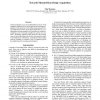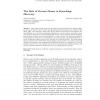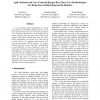792 search results - page 28 / 159 » Knowledge Engineering: Principles and Methods |
129
click to vote
IJMMS
1998
15 years 2 months ago
1998
Situated cognition is not a mere philosophical concern: it has pragmatic implications for current practice in knowledge acquisition. Tools must move from being design-focused to b...
125
click to vote
RE
2002
Springer
15 years 2 months ago
2002
Springer
A limiting factor in the industrial acceptance of formal specifications is their readability, particularly for large, complex engineering systems. We hypothesize that multiple vis...
137
click to vote
DATAMINE
1999
15 years 2 months ago
1999
Many KDD systems incorporate an implicit or explicit preference for simpler models, but this use of "Occam's razor" has been strongly criticized by several authors (...
106
click to vote
CSMR
2009
IEEE
15 years 9 months ago
2009
IEEE
Extract Method has been recognized as one of the most important refactorings, since it decomposes large methods and can be used in combination with other refactorings for fixing a...
151
Voted
AGILEDC
2008
IEEE
15 years 9 months ago
2008
IEEE
A core principle of Agile development is to satisfy the customer by providing valuable software on an early and continuous basis. For a software application to be valuable it shou...



